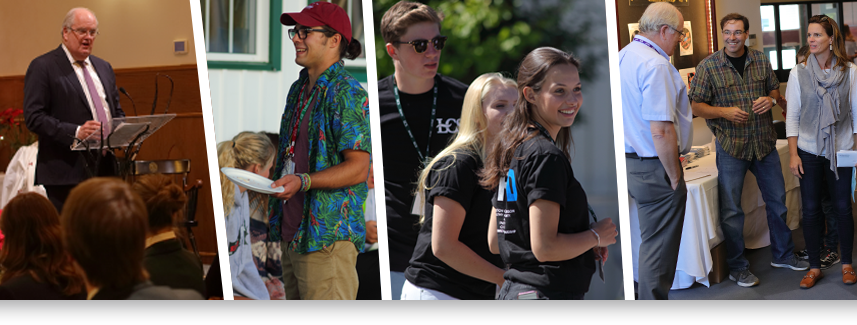1) The best independent schools are professional learning communities that both empower and support
A vibrant learning community is one where students and teachers alike are learning in and out of the classroom. Especially important, is that teachers and staff are engaged in their own professional growth and development.
It is difficult to imagine a more dedicated, committed, passionate group of teachers and staff than those at Lakefield College School—who are just so clear in their love, enthusiasm and passion for the school and for Lakefield to do well. As an independent school, it’s important to nurture an environment in which teachers and staff are able to take responsibility for their own learning, both as individuals and as a group of professionals. Providing opportunities for professionals to pursue enrichment activities in their learning requires a larger group commitment and a level of institutional commitment to ensure teachers and staff members are resourced and have the time to do this properly.
It is essential to provide a level of protected time for both collaborative and individualized learning and to create opportunities to visit other schools, see other programs and attend conferences and workshops. The newly extended Wednesday morning faculty/staff meeting times at LCS represent one such measure to open up time for this type of learning to take place.
The more a school does to ensure these things—the more it builds its capacity—the more sharing and collaboration will occur. It’s important to promote exemplars of best practice and innovation and for teachers to see terrific practice taking place in the classroom—that means opening up doors and visiting other colleagues. And it’s not about trying to change an individual teacher or staff member’s autonomy in practice. It’s about creating a more open culture of sharing and being prepared to put oneself ‘onstage’ to encourage exciting things to happen. This will move you along as a whole school and a professional learning community.
2) Independent school educators are some of the most optimistic professionals—poised for innovation and change.
One of the reasons educators are so optimistic is partly because they simply have to be. Every day, educators are prepared to go into a classroom, participate as a coach on a team, or lead a field or service trip, excited and hopeful about the impact that their work can have on their students’ growth and development.
It is important to nurture that excitement and enthusiasm which can be closely tied in independent schools to innovation and change. It is no secret that educators are always trying to change things, to see things evolve, to make a difference in their teaching or institutional practices, to see growth in student conduct, behavior and learning. As a result, teachers are far more change adept then many imagine themselves to be.
Compared to other high school environments, and many other professional environments, independent schools, in particular, have far more flexibility to change and innovate. However, it is important to think of change as an evolutionary progression of incremental steps—one step beyond what is already being done, and then one more beyond that, and another, and so on. In this way, a school can effectively internalize change processes, mobilizing a whole group of people to move along in a certain direction. Three years down the line, it’s difficult to remember when the school wasn’t doing things that way, because the changes seem very natural.
As an independent boarding school in Canada, Lakefield College School has the option to choose to do things differently from every other independent school in the country. Individual factors that make LCS unique; the fact that it is small, a predominantly boarding, but one-third day school, that it is on a lake, the types of teachers it attracts, all these things lead to a unique educational experience and rich culture which is distinctively Lakefield. The school is ready and poised to take advantage of these rich circumstances to advance and innovate. Being very clear about institutional intent, and strengthening awareness in teachers and staff of the kinds of change that can make a difference to the whole school, as opposed to just an individual class, or team, or activity, or house, is key to developing an effective collaborative approach that moves a whole school forward.
3) Independent boarding and day schools have a key role in establishing what a “great” education means
Independent schools have an important role to play in establishing what a good education means in a day when technology is omnipresent and where you are still functioning in schools like Lakefield, a traditional bricks and mortar environment comprised of people learning together.
The use of technology in the classroom is an innovative tool and is obviously here to stay. New learning streams, the introduction of social media learning systems, are very different and result from technology being present. It’s a change that is driven by student demand and many online learning schools have emerged as a result.
The key for schools that exist as physical places, where you have a collection of people learning together in the class, in a boarding house, sports fields, or in a service activity, is to be very conscious of how you build better opportunities for improved learning by virtue of being present, together in real time. Boarding schools like Lakefield College School, should strive for excellence in offering a balanced program that provides a breadth of opportunity for students to choose from, while at the same time offering opportunity to pursue, in greater depth, personal interests and develop areas that they have real skills and talents in. It is one of the more challenging demands for independent schools to fulfill, yet it’s vitally important. From the perspective of the student experience, it asks the question: how do you take individual strands of learning and make whole cloth from it in a meaningful and impactful way, that is valuable to students in terms of their development? All of the choices offered should be good, obviously, and that’s certainly Lakefield’s intention, but they should also roll up together to do something very special, in this case, to provide a learning experience that is distinctively Lakefield.
4) A quality education can be compared to becoming a great Chef.
When speaking about quality education and offering the best independent boarding school experience possible, it can be useful to think of the metaphor of becoming a Chef—not just a regular Chef or Sous Chef, but a great Chef.
The concept of a great Chef is simply that the person has a mastery of the content, has great skills in terms of putting a meal or dish together, and that they ensure they have access to the best possible range of ingredients. A great Chef is discerning, creative and resourceful, they are not looking specifically to a cook book recipe where they can move from point A to B, to C, to D,…to some end. They create their own dishes, look for the right resources, discover the best ingredients, understand how flavors and ingredients mix together and ensure the best presentation for a particular audience. All of these skills are really important in a great Chef’s repertoire and they are important in a high school graduate’s repertoire as well. The role of great students, educators and administrators could be viewed similarly to that of great Chefs. Schools must be able to place great opportunities in front of their students and staff so that their choices are all terrific, so that they can fashion their own unique experience through their life at Lakefield to ensure it holds value and meaning as part of their learning journey. Our obligation as a school, is to be very intentional about resourcing that to ensure it happens not just for our students, but for the adults that are part of our school community.
5) School-wide reading useful for all independent school staff and boards to consider
Mentioned below are three book titles worthy of reading, not because they are exceptionally new or innovative, but because they share some very sound ideas:
1. Good to Great by Jim Collins
For its points about being very conscious—thoughtful and deliberate—about moving an organization from being good to being a great organization, while at the same time valuing stability and longevity in an institution and institutional commitment—the idea that you can be in a place for a long period of time and add real value, an important piece for people to think about.
2. Mindset by Carol Dweck
It’s a book about fixed mindset versus growth mindset and the reactions of people. Teachers should read it from the perspective of their own classroom. Students will have both fixed and growth mindsets and their needs, their interests and their reactions are going to be very different. And so, it’s useful for teachers to consider different mindsets, just as they consider different learning strategies, to present materials in ways that students individually learn best.
3. #EdJourney: A Roadmap to the Future of Education by Grant Lichtman
The author, who travelled all across the United States looking at public schools, private schools and many other types of schools (including virtual schools) shares some great examples of innovative practices in education, providing a great source of inspiration for any educator.

Guy McLean joined Lakefield College School as Interim Head of School for the 2016/17 academic school year. An educator for over 40 years, Guy brings a wealth of experience and accomplishment. He is former Headmaster at Appleby College in Oakville (1987-2012) and has been very active in the independent school community, serving as Deputy Chairman of the Round Square Board and in the past as an accreditation officer for Canadian Accredited Independent Schools (CAIS), leading many independent school accreditation reviews across Canada. Guy’s father, Ian McLean ’35, was a graduate of Lakefield College School.

